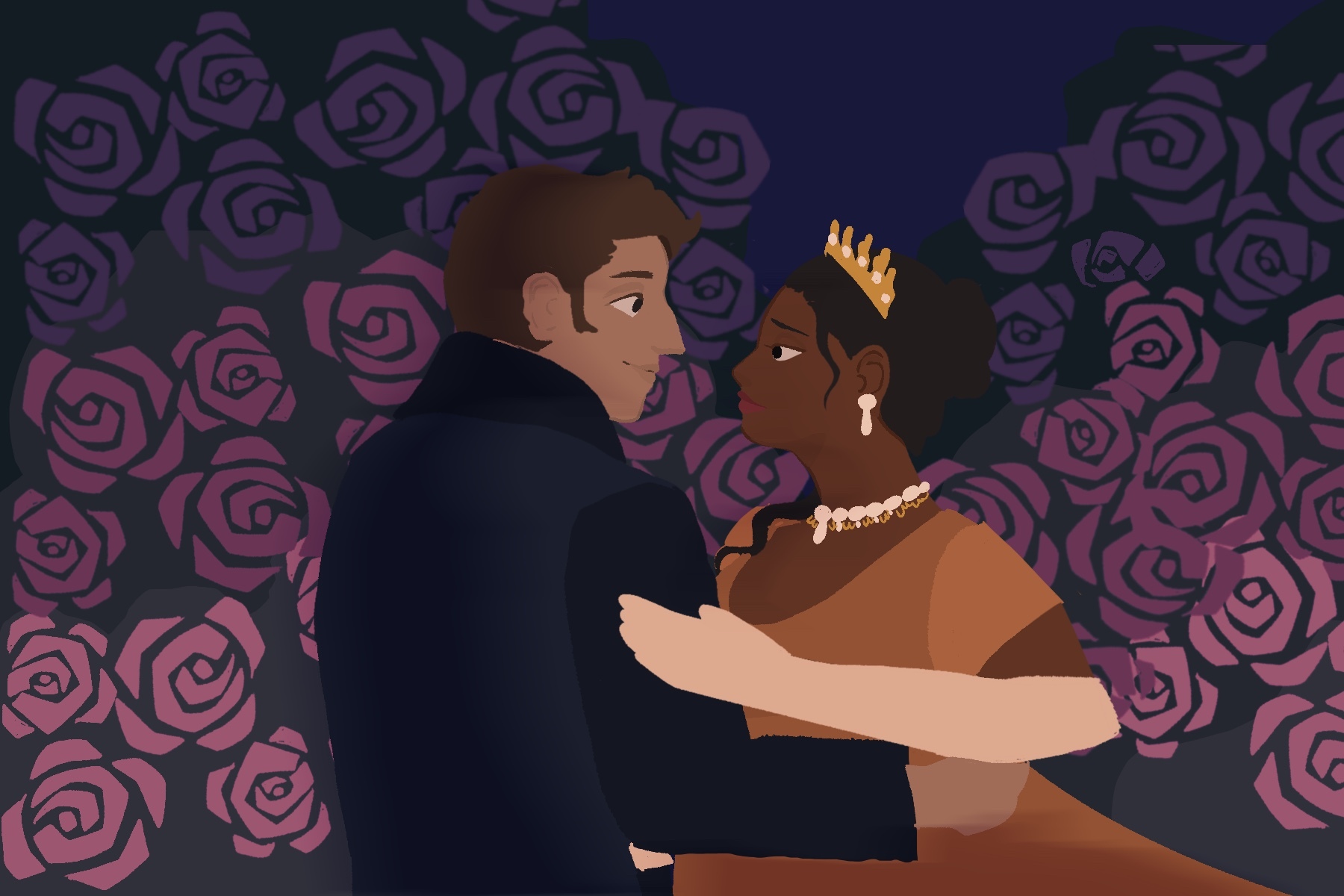With the show’s massive popularity in the wake of Season 1, the second season of “Bridgerton” had big shoes to fill. The series had previously been praised for its diversity, cinematography and soundtrack, and this season combined all of these for one whirlwind enemies-to-lovers central storyline. Instead of the duke from Season 1, the second season’s love interest is Anthony Bridgerton (Jonathan Bailey), the equally rakish viscount and eldest brother of the Bridgerton family. Instead of the innocent, demure Daphne Bridgerton (Phoebe Dynevor), our female lead this season is the strong and outspoken Kate Sharma (Simone Ashley). Anthony and Kate’s romance is full of plot twists and forbidden desire, successfully playing on common rom-com tropes and emotional connections to create an entire season filmed through a feminine lens.
Warning to the reader: Spoilers for “Bridgerton” Season 2 ahead!
Kate Sharma has traveled from India with her mother and younger sister, Edwina (Charithra Chandran). Her only goal is to find an English husband of nobility for Edwina. Kate has resigned herself to life as a governess and expresses quite publicly that she does not intend to marry. She is dedicated to her family, especially her sister. But this dedication is called into question when she falls in love with the viscount … who later becomes engaged to her sister.
The “female gaze” is a feminist term that refers to the gaze of the female spectator, character or director of an artistic work. It is the opposite of the male gaze, which caters to what a male viewer might like to watch. One definition suggests that the female gaze “alludes to the right of women to adopt the active and objectifying gaze that has traditionally and stereotypically been associated with males, undermining the dominant cultural alignment of masculinity with activity and femininity with passivity.” This definition seems particularly appropriate for Season 2 of “Bridgerton” since it is far more focused on filming the male characters in an objectified manner than the women. It does not shy away from the desires of women, but rather places these alongside the desires of men.
One of the most iconic scenes from this season is a clear example of this role reversal: basically, a wet T-shirt scene. While helping Kate out of a canoe in Episode 5, Anthony trips and falls into a lake, and emerges with his now-translucent dress clothes clinging to his skin. This kind of scene is a staple for the male gaze, but usually ends with a woman in a compromising position. It was honestly refreshing to see such an overtly sexualized interaction focused on a man instead of a woman. What was equally refreshing was the Sharma sisters’ reactions — clearly full of desire, despite Kate warning her sister hypocritically, “It is not proper to stare.”
Especially rare in period dramas, a sense of equality persists between Kate and Anthony — Kate is older and wiser than most of the other young women of the ton (aged “six and twenty”) and is educated and well-traveled. This places her on more level footing with Anthony, who is 29 in the Netflix series, and received his education at Oxford University. It is implied that Kate is more experienced than other women in society, meaning she understands what sex is and how it works, unlike the utterly in-the-dark Daphne we cringed with in Season 1.
Interestingly, there are far fewer sex scenes than in Season 1, but this season builds much more slow-burn tension. Terms like “enemies to lovers” and “slow-burn” are incredibly popular. With a recent rise in fan fiction and “spicy” novels on TikTok, young women everywhere are more in tune than ever with the tropes they enjoy watching and reading about. Kate and Anthony may appear at constant odds with each other, but that’s just part of what makes them tick. Through quick stolen glances, long, pained looks across ballrooms, and close, breathy interactions alone in dark offices, the romance between Kate and Anthony only builds.
Perhaps one of the most iconic examples of the female gaze is “Pride and Prejudice.” This season of “Bridgerton” is littered with call-backs to the “Pride and Prejudice” films, especially the lake scene and scenes that focus on hands. The scene in the 2005 “Pride and Prejudice” film where Mr. Darcy helps Elizabeth out of her carriage, and then flexes his hand while walking away from her, has elicited swooning for over a decade. “Bridgerton” directly references this scene multiple times throughout its second season. The barely-there touches between Kate and Anthony are perfect examples of the female gaze — it is the epitome of desire and longing in a society where men and women are strictly separated until after their marriage, a visual expression of “I want her but can’t touch her.”
In Episode 4, during a hunting expedition, Kate steps over a branch and reveals much of her thigh in the process — an action that one TikTok user called “serving the 1814 equivalent of flashing your t*t$.” “Bridgerton” embraces the female gaze by proving it’s unafraid of female sexuality and confidence. Toward the end of the season, there is one intense sex scene between the two main characters in a garden, but it’s the culmination of seven episodes of passion and longing.
While the female gaze is not going to cater specifically to every woman, it does cater to some longstanding tropes and stereotypes. Women are traditionally more sensitive, emotional and loving, which is why slow-burn tension is so appealing. But the female gaze is not limited to innocent romance, and so by embracing female sexuality and desire alongside slow-burn romance, “Bridgerton” embraces all facets of the female gaze.
What makes Kate and Anthony’s romance even more palpable is their innate sense of obligation to their families. Anthony feels he has a duty in his role as viscount to marry well (putting love matches aside) and to manage his family and their various estates, a role thrust upon him after his father’s sudden death. Kate’s duty to her sister and extended family is to ensure that Edwina marries English nobility. Kate’s struggle with sacrifice as the eldest daughter rings especially true to children of immigrants. There is immense pressure on both Kate and Anthony. They both attempt to be selfless and make sacrifices in the name of familial love and duty, but these choices often make them deeply unhappy and sometimes hurt their loved ones.
When Edwina recognizes the passion between her fiancé and sister, she quickly calls off the engagement, infuriated by their deception. But even this is tempered with sisterly affection — it’s more like outrage that Kate never told Edwina how she really felt, rather than her being attracted to Anthony in the first place. After Kate is concussed in a horse-riding accident that puts things into perspective for all parties, Edwina sets aside her anger and is just happy to see her sister finally being true to herself. This only makes Kate and Anthony’s eventual union — and admitting to themselves that they are both worthy of a marriage for love — even sweeter.
Anthony confesses his feelings in a “Pride and Prejudice”-style monologue in the final episode. It’s a finale-worthy release, pulling the valve on their feelings, finally laying everything out on the table: that they are in love with each other, that they vex each other, and that they will humble themselves before one another. Season 2 of “Bridgerton” has secured the title of the most popular English language series on Netflix, and it has accomplished this by paying close attention to the female gaze — if they maintain this in future seasons, one can only imagine the success that will follow.

















Hi, The finale of the series is very good, I recommend you to watch it.